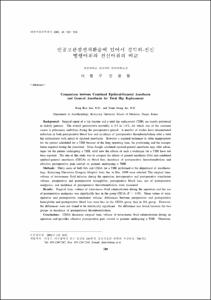KUMEL Repository
1. Journal Papers (연구논문)
1. School of Medicine (의과대학)
Dept. of Anesthesiology & Pain Medicine (마취통증의학)
인공고관절전치환술에 있어서 경막외-전신 병행마취와 전신마취의 비교
- Keimyung Author(s)
- Lee, Jung Koo
- Journal Title
- 대한마취과학회지
- Issued Date
- 2001
- Volume
- 40
- Issue
- 3
- Abstract
- Background: Surgical repair of a hip fracture and a total hip replacement (THR) are mostly performed in elderly patients. The overall perioerative mortality is 0.5 to 1.0%, for which one of the common causes is pulmonary embolism during the postoperative period. A number of studies have demonstrated reduction in both perioperative blood loss and incidence of postoperative thromboembolism after a total hip replacement with spinal or epidural anesthesia. However a regional technique is often inappropriate for the patient scheduled for a THR because of the long operating time, the positioning and the manipulation required during the procedure. Even though combined epidural-general anesthesia may offer advantages for the patient undergoing a THR, until now the effects of such a technique for a THR have not been reported. The aim of this study was to compare the effects of general anesthesia (GA) and combined epidural-general anesthesia (CEGA) on blood loss, incidence of postoperative thromboembolism and effective postoperative pain control on patients undergoing a THR.
Methods: Thirty cases of both GA and CEGA for a THR performed at the department of anesthesiology, Keimyung University Dongsan Hospital from Jan. to Dec. 1999 were selected. The surgical time, volume of intravenous fluid infusion during the operation, intraoperative and postoperative transfusion volume, preoperative and postoperative hemoglobin, postoperative blood loss, use of postoperative analgesics, and incidence of postoperative thromboembolism were measured.
Results: Surgical time, volume of intravenous fluid administration during the operation and the use of postoperative analgesics was significaltly less in the group CEGA (P < 0.05). Mean values of intraoperative and postoperative transfusion volume, differences between preoperative and postoperative hemoglobin and postoperative blood ioss were less in the CEGA group than in GA group. However, the differences were not found to be statistically significant. No difference was found between the two groups in incidence of postoperative thromboembolism.
Conclusions: CEGA decreases surgical time, volume of intravenous fluid administration during an operation and provides effective postoperative pain control in patients undergoing a THR. Therefore,
- Alternative Title
- Comparison between Combined Epidural-General Anesthesia and General Anesthesia for Total Hip Replacement
- Keimyung Author(s)(Kor)
- 이정구
- Publisher
- School of Medicine
- Citation
- 이정구 et al. (2001). 인공고관절전치환술에 있어서 경막외-전신 병행마취와 전신마취의 비교. 대한마취과학회지, 40(3), 320–328. doi: 10.4097/kjae.2001.40.3.320
- Type
- Article
- ISSN
- 0302-5780
- Appears in Collections:
- 1. School of Medicine (의과대학) > Dept. of Anesthesiology & Pain Medicine (마취통증의학)
- 파일 목록
-
-
Download
 oak-bbb-835.pdf
기타 데이터 / 220.68 kB / Adobe PDF
oak-bbb-835.pdf
기타 데이터 / 220.68 kB / Adobe PDF
-
Items in Repository are protected by copyright, with all rights reserved, unless otherwise indicated.